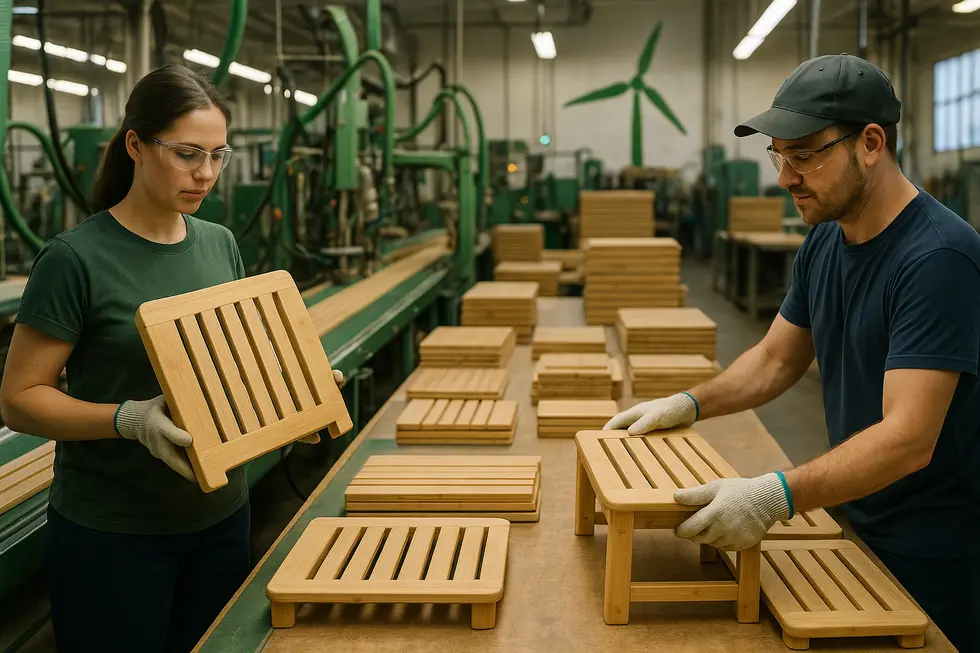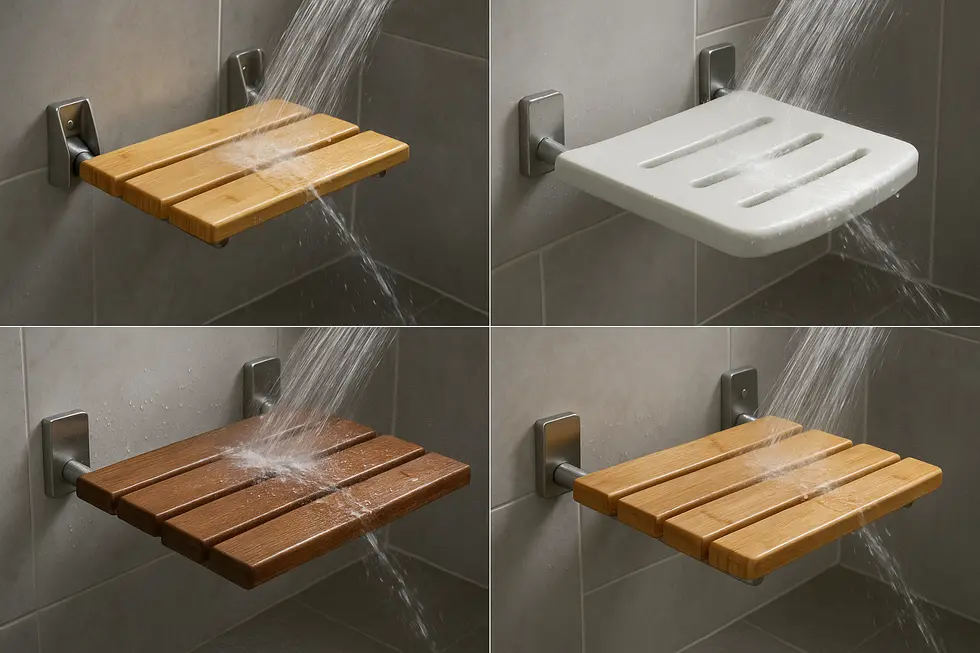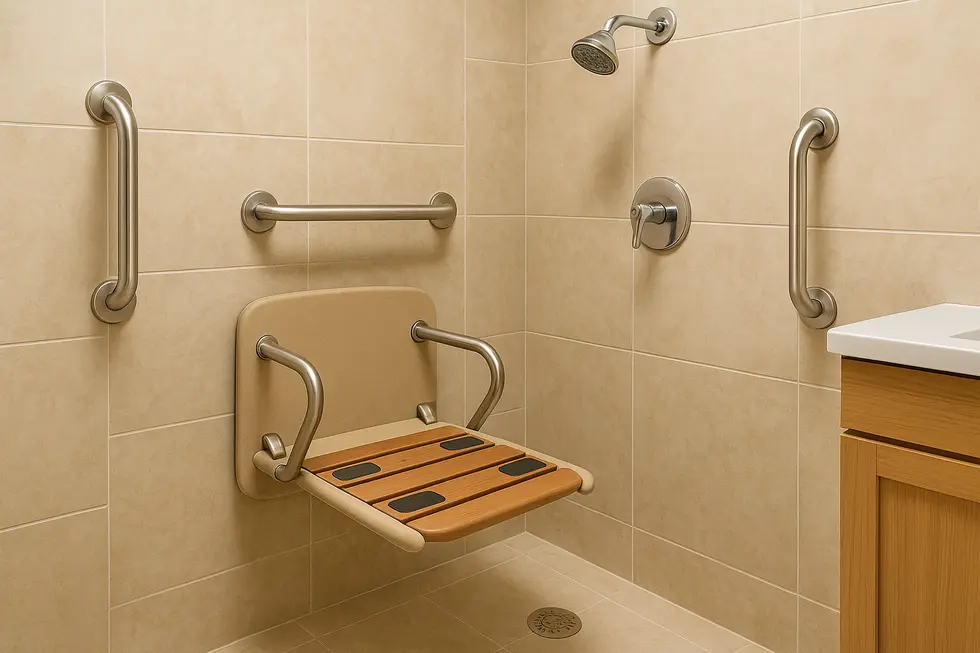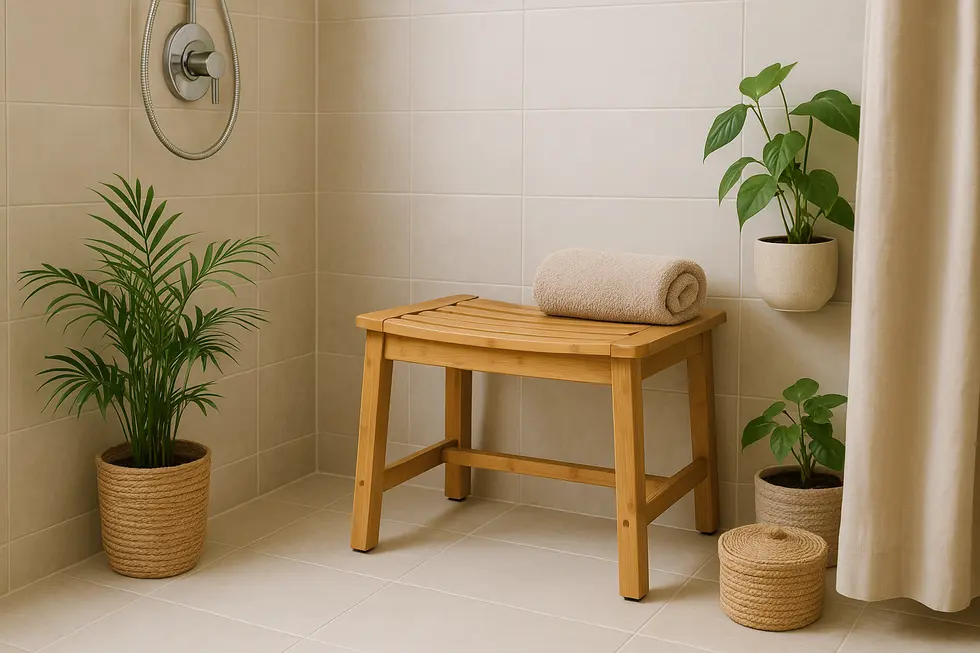Shower Seat
Eco-Friendly Shower Seats: Combining Comfort, Sustainability, and Safety
Eco-friendly shower seats provide a smart blend of sustainability, functionality, and safety for environmentally-conscious families. The eco-friendly materials shower seat, made from bamboo, HDPE, teak, nylon, and aluminum, emphasizes earth-friendly sourcing, reliable performance, and accessibility features. Each chapter explores a different aspect of how these shower seats can enhance your family’s bathing routine while supporting a greener planet.
From Field to Bathroom: How Sustainable Sourcing and Smart Manufacturing Shape Eco-Friendly Shower Seats

Sustainability begins long before a shower seat reaches the bathroom; it is rooted in the way raw materials are grown, mined, harvested, and finally transformed. Take bamboo. Farmers select fast-growing clumps that mature in just three to five years, then cut canes by hand, allowing roots to regenerate the next crop without soil disruption. After kiln-drying, boards are laminated with low-VOC adhesives and pressed under high heat powered increasingly by biomass from leftover bamboo chips. The result is a stable panel that retains bamboo’s natural water-repellent silica without synthetic coatings.
A different but equally circular story surrounds HDPE. Post-consumer milk jugs are cleaned, shredded, and pelletized in closed-loop facilities where wash water is continuously filtered and reused. Precision extrusion molds the recycled pellets into dense planks that resist swelling better than hardwood. Any off-cuts are immediately re-ground and fed back into the hopper, so material loss is virtually zero. This cradle-to-cradle pathway means every seat can itself be recycled again at end-of-life, shrinking landfill pressure.
When greater structural strength is required, manufacturers turn to hard-anodized aluminum and marine-grade stainless steel. Both metals boast high recycled content and indefinite recyclability. Modern foundries employ electric arc furnaces powered by renewable energy, slashing carbon emissions compared with traditional coke-fired smelters. Anodizing baths capture and re-circulate water, reducing chemical discharge while creating a pore-sealed surface that rejects corrosion in steamy environments.
For accessible designs, nylon compounds infused with antibacterial ions are injection-molded in energy-efficient presses. Molds incorporate cooling channels that shorten cycle times, cutting electricity demand. Because nylon is free of heavy metals, rejected parts can be safely reground and remolded.
Thoughtful engineering completes the sustainability picture. Smooth radii minimize material use without compromising load capacity, and modular components allow damaged slats to be swapped instead of discarding the whole seat. Detailed installation guides—such as this resource on installing a wall-mounted shower seat—help users position anchors correctly, preventing premature failure and waste.
Every decision, from responsibly managed bamboo groves to recycled-content metals, creates a chain of small savings that add up to a lighter footprint—and a shower seat built to last. (External reference: https://www.homedepot.com/p/N-A-16-in-W-Adjustable-Feet-Waterproof-HDPE-Shower-Stool-in-White-with-Storage-Shelf-for-Spa-Bathroom-SA1129E102/336214241)
Built to Last: Measuring Strength, Moisture Resistance, and Sustainability in Eco-Friendly Shower Seat Materials

When you lean your full body weight on a shower seat, you are testing three critical qualities at once: structural strength, resistance to moisture damage, and long-term environmental impact. Bamboo earns high marks on all counts. Although technically a grass, its dense fibers rival hardwoods in compression strength. Laboratory flexural tests routinely show properly laminated bamboo boards withstanding more than 8,000 psi before failure—well above the loads generated by an average adult. Because bamboo contains natural silica and lignin, it resists swelling; a thin plant-based sealant keeps the surface smooth without relying on petrochemical varnishes.
HDPE, a recycled plastic often used in marine decking, excels in impact testing rather than flex. Drop-weight studies reveal no cracking even at sub-zero temperatures, a performance wood cannot match after prolonged soaking. Its closed-cell composition blocks water entirely, so mildew never gains a foothold. While producing virgin HDPE is energy-intensive, using post-consumer resin gives discarded milk jugs a second life and can cut embodied carbon by up to 70 %.
Teak sits between plant fibre and polymer. Slow-grown heartwood is dense with natural oils, scoring a Janka hardness close to white oak. That hardness translates to scratch resistance, an asset when mobility aids or metal shampoo bottles scrape across the bench. Still, teak’s slower regeneration rate means responsible forestry certifications are essential when weighing its sustainability credentials against faster-renewing bamboo.
For users who need wall-mounted models, load paths change from vertical compression to shear at the hinges. Here, aluminum brackets paired with glass-fiber reinforced nylon slats shine. Salt-spray chambers show negligible corrosion on anodized aluminum after 1,000 hours, and nylon retains 90 % of its tensile strength even after repeated thermal cycling. These metrics justify the higher upfront cost when long life span and recyclability are priorities.
Selecting the right material blend also simplifies maintenance. HDPE cleans with mild soap; bamboo benefits from an annual wax rub; teak needs only occasional oil, and aluminum/nylon pairs require nothing more than a rinse. For a deeper look at proper fitting that protects structural integrity, see our guide to installing wall-mounted shower seats.
Want to compare bamboo bench options firsthand? Visit Wayfair’s curated collection: https://www.wayfair.com/home-improvement/sb1/bamboo-shower-benches-c1869676-a151079~494442.html
Wellness and Assurance: Eco-Friendly Shower Seats Engineered for Health, Safety, and Inclusive Comfort

Eco-conscious materials do more than lower the carbon footprint of a bathroom—they actively contribute to a safer, healthier wash routine. Bamboo, for example, contains naturally occurring antimicrobial agents that help suppress mold and bacteria, while its tight grain resists water absorption. When sealed with low-VOC waterproof varnish, the surface becomes even more hygienic and simple to wipe down, an advantage appreciated by anyone sharing a family shower or caring for loved ones with reduced immunity.[https://www.homedepot.com/p/N-A-16-in-W-Waterproof-2-Tier-Wood-Shower-Stool-in-Bamboo-with-Storage-Shelf-for-Seniors-Adults-Disabled-SA1129E101/336214220]
Safety considerations begin at floor level. Non-slip rubber feet or integrated pads keep the seat planted on slick tiles, while angled legs distribute weight outward to prevent tipping. Slatted tops fashioned from reclaimed wood or precision-milled HDPE let water drain immediately, eliminating the puddles that so often cause dangerous missteps. Hardware—whether stainless steel bolts or powder-coated aluminum wall brackets—is selected for corrosion resistance, ensuring reliability long after cheaper alternatives would have weakened.
Accessibility features are now baked into many earth-friendly designs instead of tacked on as afterthoughts. Contoured seats follow the body’s natural curves, easing pressure on hips and thighs. Fold-down armrests give users a convenient leverage point for transfers, and height-adjustable models adapt to changing mobility needs without requiring a full remodel. For compact bathrooms, wall-mounted seats fashioned from sustainably harvested teak fold flat, freeing up standing room between showers; a quick look at guidance on installing a wall-mounted shower seat demonstrates how straightforward an upgrade can be.
Aesthetics deserve mention, too. The warmth of bamboo or reclaimed barnwood contrasts beautifully with cool ceramic, inviting users to linger and relax. Engineered plastics formulated from recycled milk jugs provide a crisp modern profile in monochrome bathrooms, while still ticking every eco box. By merging responsible material choices with thoughtful ergonomics and robust safety elements, today’s shower seats prove that sustainability and user wellbeing are not competing goals—they are the same design brief executed to perfection.
Final thoughts
Opting for eco-friendly shower seats allows families to prioritize both the health of their environment and the safety and comfort of their homes. By understanding sustainable sourcing practices, evaluating product durability, and exploring features that promote accessibility, choosing the right shower seat becomes a rewarding endeavor. Remember, improving your household doesn’t have to come at the earth’s expense—a green choice today secures our tomorrow.
Experience a new standard of clean with PEGABidet—designed for comfort, safety, and independence. Join thousands who trust us to make personal care simple and dignified. Contact us contact@pegabidet.com
About us
PEGABidet is a brand owned by L.A NEXTGEN LLC, based in California. We design intuitive, hygienic, and accessible bathroom solutions that prioritize safety, dignity, and independence. Our mission is to make personal care effortless and empowering for people at every stage of life.

